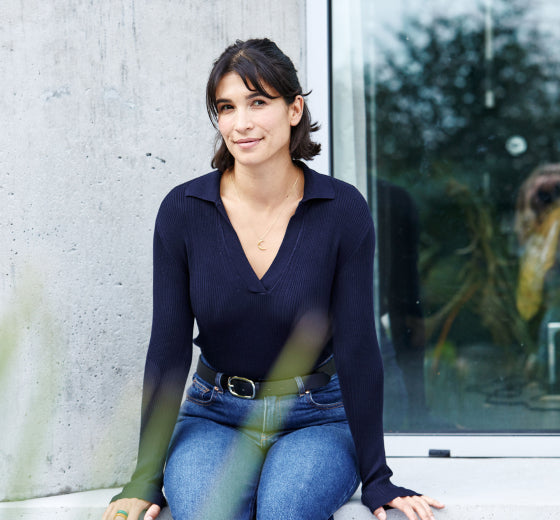
Beauty from Within - Embracing Positive Aging in our Skin
6 Min read
There’s a delicate, and sometimes difficult, balance of lovingly accepting the skin we are in and gracefully embracing the changes that come with age.
Our skin, a beautiful canvas for creative expression and a reflection of our emotions, also serves a deeper purpose beyond aesthetics. It is a shield for our immune system, a conduit for touch, and a mirror reflecting our internal health.
Despite societal and generational beliefs that ageing is a curse to be fought against, we think it's time to debunk these myths and celebrate the journey inevitable to those of us who are privileged with a long life. What if instead we saw ageing not as a decline, but a transformation, a process where our wisdom and body creates a tapestry of experience. What if instead we believed that the best was yet to come and looked to support our body and skin for the next chapters.
The skin we’re in
The skin, our largest organ, serves many crucial functions. Rightly or wrongly, for many of us it’s closely tied to our feelings of confidence. Our skin also protects against pathogens, UV radiation, and toxins, supporting the immune system. Rich in nerve endings, it enables sensory perception, facilitating communication and a deeper connection to others. It regulates body temperature, synthesises vitamin D and aids in waste elimination. Caring for our skin is vital for overall health.

Hormones change
There are many factors which affect our skin as we age; lifestyle, diet, sun exposure, stress, pollution - but hugely influential to the appearance and health of our skin is how closely our hormones are tied to its maintenance.
Oestrogen in particular is integral for maintaining and protecting your skin barrier. The intelligent design of this barrier aims to keep out unwanted pathogens and chemicals and keep fluid in to maintain hydration. Oestrogen also plays an important role in sun protection and the skin's ability to lock in moisture, produce natural hyaluronic acid, sebum and ceramides. Without these, water escapes easily causing the skin to become dry. Collagen production is also closely linked to oestrogen levels, and therefore as oestrogen drops when we start the menopause journey, so does collagen formation. Collagen forms the architecture of your skin giving strength and suppleness. Without this, the skin loses its tightness and becomes more prone to fine lines and wrinkles.
Studies show up to 30% of dermal collagen is lost in the first 5 years after the menopause and that levels subsequently reduce at a rate of 2.5% per menopausal year which results in a change in our appearance.
Our skin's health is also deeply intertwined with the nutrients it receives. We are indeed what we eat. Everything we consume is used by our body to maintain and repair our cells and as cofactors for all our metabolic processes. To nourish our skin from within, it is helpful to prioritise a nutrient-rich diet and supplement it with key ingredients that promote skin health.
Antioxidant heroes
Antioxidants play a crucial role in supporting skin health as we age by reducing oxidative damage and inflammation. Vitamins like A, C, and E, help to protect our skin from environmental stressors and promote cellular repair. These antioxidants combat skin ageing by countering free radicals, which if left unchecked, cause DNA damage and inflammation. Beyond vitamins, other nutrients such as collagen, green tea or matcha and omega-3 fats also have antioxidant properties, protect skin from damage, and promote a healthy appearance. By incorporating antioxidant-rich foods and nutrients into our diet, we bolster our skin's defences.
The Vitamins
Vitamins A and C are powerhouse nutrients known for their skin-rejuvenating properties. Obtained from a range of whole foods such as leafy greens, fruits, vegetables and supplements, these vitamins stimulate collagen production, reduce free radical damage, and promote a glow from within.
Vitamin A, is also commonly used in topical skin care and often disguised as retinol on product labels. Retinol and retinoids have long been hailed for their transformative effects on the skin. Incorporating this nutrient into your diet can also be a great tool. Whether from beta carotene-rich sources like leafy greens, carrots, and sweet potatoes, or from animal-derived foods such as grass-fed meat, liver, eggs and fish, vitamin A nourishes the skin from within, promoting a smoother, more radiant complexion. Remember, vitamin A is fat-soluble, so pairing these foods with healthy fats enhances nutrient absorption.
Vitamin C, hailed as a skincare superhero, boasts a myriad of benefits for both topical application and internal consumption. When ingested, vitamin C provides antioxidant protection, aids collagen synthesis, and bolsters immunity while enhancing iron absorption—another crucial nutrient for skin and hair health. Fresh fruits and vegetables serve as excellent sources of vitamin C, including citrus fruits, bell peppers, broccoli, cherries, kiwi, brussel sprouts, spinach, and berries.
Polyphenols
Polyphenols are compounds found in plants and exist abundant in vegetables, fruits, herbs, spices, tea, and other botanicals such as cacao and matcha. Due to their antioxidant and anti-inflammatory properties, polyphenols have become one of the most important compounds to utilise for skin health.
Polyphenols have been shown to inhibit collagen degradation, increase collagen synthesis, and reduce inflammation.
Matcha is rich in chemicals called catechins that have been shown to help protect your skin from the harmful effects of UV radiation and reduce inflammation. Matcha also promotes natural collagen production.
Cacao beans contain high levels of minerals alongside vitamin C. It may also increase blood flow, supporting nourishment and skin hydration.
Rosehips, the vibrant fruits of the rose plant, offer a myriad of benefits for skin health. Historically prized as a remedy for skin, rosehips have shown efficacy in smoothing skin texture, and boosting moisture levels. Bursting with Vitamin C, rosehips stand as one of nature's richest sources of this vital nutrient, while also containing natural tretinoin, the active form of Vitamin A.
Get hydrated
Hydration is paramount for skin health, with water being our skin's number one ally. Optimal hydration replenishes and maintains skin moisture and therefore ensuring you drink plenty of water, herbal teas and nourishing drinks across the day is key. To truly hydrate from within, minerals called electrolytes are also needed to shuttle water into the cells. As we age, it becomes more difficult to absorb minerals, such as calcium and magnesium, both of which are essential electrolytes. As well as ensuring we have a mineral rich diet, utilising a clean electrolyte supplement can also be supportive.

Protein for skin health
Focusing on protein as we age has wide reaching benefits, including supporting the health of our skin. Amino acids — the components of protein — are in fact the building blocks of skin. Without enough protein we are not giving our skin the raw materials it needs to repair.
A key protein is of course collagen. Incorporating collagen peptides into our diet has been shown to support skin health as we age. Type I collagen peptides have been shown to stimulate natural collagen production, improving wrinkle depth and elasticity. The skin-improving activity of collagen supplementation not only boosts the existing collagen in the dermis, but also stimulates fibroblasts to produce more collagen, elastin, and hyaluronic acid to help improve hydration.
A whole-body approach
A holistic approach to skin care involves not only nourishing our bodies with nutrient-dense foods but also reducing factors that damage our skin. Minimising sugar, alcohol, smoking, and exposure to pollution, as well as reducing synthetic ingredients found in processed foods, can all contribute to healthier, radiant skin.
Moreover, addressing stress and sleep issues and nurturing our gut microbiome can positively impact our skin's appearance.





